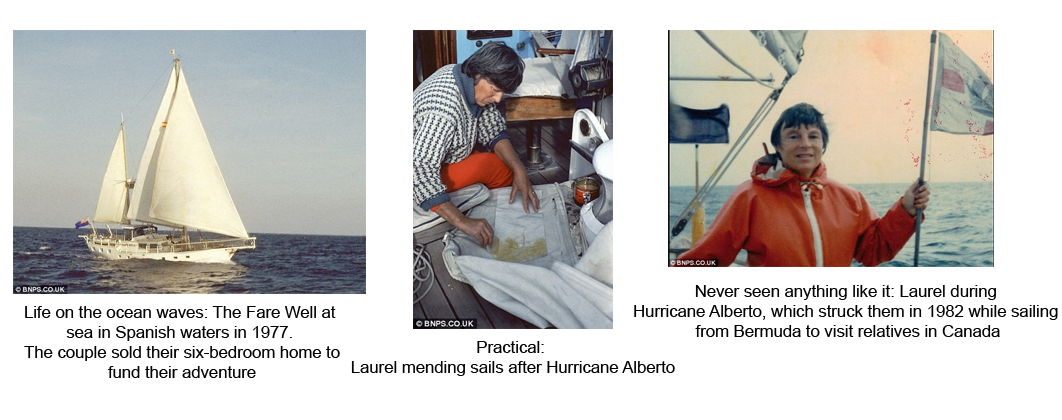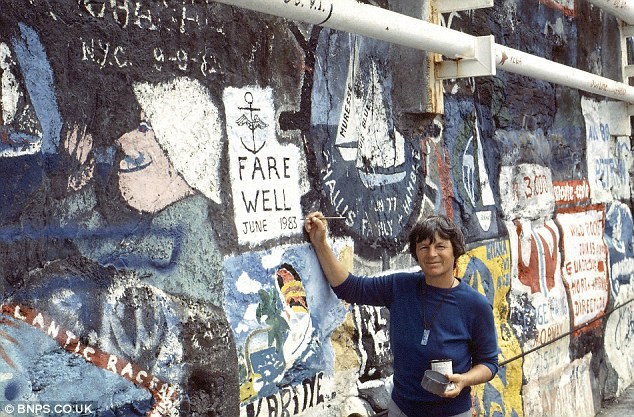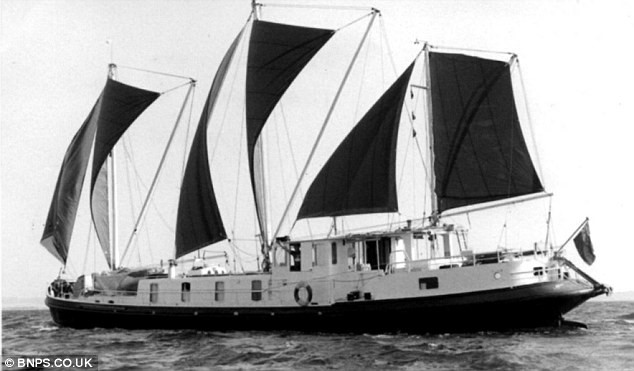

From the outside, there is nothing remarkable about the humble blue and white barge boat moored next to a rickety pontoon just behind Rochester High Street on the banks of the River Medway in Kent. But concealed below deck on the 40ft Faraway is a lifetime of memories: shelves filled with log books, diaries and photograph albums — mementos of an astonishing sea-faring odyssey which spans almost four decades. Bill and Laurel Cooper weighed anchor and set sail in 1976 after selling their home for £48,000, discarding most of their possessions and kissing their grown-up children goodbye.

For the past 36 years, they have enjoyed the kind of life that many rat-race-fatigued Britons only ever dream of. They have berthed in 45 different countries, crossed seven seas — as well as the Atlantic Ocean — and pottered along 22,000 miles of inland waterways across Europe and the U.S.
But having sailed 100,000 miles — equivalent to travelling around the world four times — Bill, 83, and Laurel, 82, who are about to celebrate their diamond wedding anniversary, have finally returned to Blighty, saying that creeping ill health and age have finally defeated them.
Their memories are filled with endless summer evenings in the Mediterranean and Caribbean, nights spent beneath the stars, enchanting stories of flying fish, whales and dolphins, as well as adventures which saw them being struck by lightning and pitting their wits against hurricanes, gales and — during one bizarre encounter — an intimidating portion of the U.S. naval fleet.

Leaving the rat race: Laurel pictured with Nelson the cat as she boards the Fare Well for the start of their decades-long voyage in 1976
Not surprisingly, they are planning to write a book about their maritime antics — one to add to the many boating manuals they have written over the years.
‘It’s been an extraordinary life,’ says Laurel, a former magistrate and art teacher. ‘We’ve been blissfully happy together. We’ve enjoyed ourselves immensely.’
What is perhaps even more remarkable is that when the couple made their life-changing decision to go to sea back in 1976, they appeared to have what was, even by modern standards, a pretty perfect life.
Bill, a former Lieutenant Commander in the Royal Navy, was enjoying a lucrative career in the City while Laurel raised their two children — Shelley, now 60, and Benedick, 57 — at their stunning 18th-century former coaching inn on the banks of the River Medway.
At the time they decided to give it all up, Bill, a gilts broker and a former secretary of the City of London Labour Party, was working tirelessly behind the scenes as an informal advisor to Harold Wilson during a time of economic strife which has echoes in today’s financial crisis.
‘Wilson was incredibly arrogant,’ says Bill. ‘He wouldn’t listen to anyone’s advice. It was hopeless trying to help him.’
Fed up with the daily grind, Bill set off for Chatham railway station one morning in 1972. But instead of taking the train, he returned home.
‘I’d had enough,’ he says. ‘I decided that was it. I went home and told Laurel: “I’m not going in any more.” I knew I wanted more from life.’

At first Laurel was not too keen when her husband announced he wanted to jack in his job, sell the family home and set sail for Europe in the yacht he had been building at the bottom of the garden.
It took another four years, during which time he continued working for Wilson part-time, to finish the 50ft steel ketch Fare Well — and persuade Laurel to sail away with him.
‘I had a lovely life and a lovely house,’ she says. ‘I knew he’d been having a rough time, but until he announced he wanted to go, I never really thought he’d give up his job.’
Insisting that the boat was fitted with a proper bath and a small library for her books, Laurel finally agreed. The couple sold their six-bedroom home in 1976, giving most of the money to their children and using their investments to fund their adventures.
Once we set sail,’ says Laurel, ‘it was as if a burden I hadn’t known existed was lifted. Getting rid of our possessions was such a relief. We had this tremendous sense of freedom the moment we went to sea.’
In fact, both Bill and Laurel, who first met as 16-year-olds during the war and married in 1952, already had sailing in their blood.
Solicitor’s daughter Laurel learned to sail with her father on the Norfolk Broads. Bill comes from a family of herring fishermen which can be traced back to the 1720s.
As a boy, he helped out on his father’s deep sea steam trawler, and at 16 worked on the Norfolk lifeboat, helping to retrieve the bodies of RAF pilots shot down over the North Sea.
He turned down a place at Cambridge in favour of Dartmouth Royal Naval College in 1946. Not even a near-brush with death when he fell overboard during a yacht race across the Channel in 1949 deterred him from dreams of life at sea.
Without a life-jacket, the then 19-year-old stayed afloat all night and was eventually found the following morning and temporarily revived with hot tea before spending six weeks in hospital with pneumonia and lung problems which afflict him to this day. It was, says Bill, the first time he realised that ‘the sea is a monster’.
‘There is nothing romantic about it all. Anyone who says they love the sea is an idiot. If you are in love with someone you don’t expect them to creep up behind you and box you on the back of the head. It’s boats I love, not the sea.’

Picture postcard: Laurel leaves her mark on the old wall in Horta, in The Azores, in 1983
For the first leg of their voyage, the Coopers headed non-stop to Gibraltar, a journey of 1,100 miles, with their one-eyed cat Nelson on board.
‘Then we spent a year or two pottering about the Med,’ says Bill. They wintered in the Balearics and Corfu where their children flew out to join them for holidays before sailing towards Monte Carlo where they recall mooring for 50p a night and getting a perfect view of the Grand Prix which was being held there.
‘We were blissfully happy,’ says Laurel, who cut her hair short after a month at sea and has never allowed it to grow back. Before leaving England, she also got rid of most of her dresses and skirts and bought trousers. She replaced her make-up with sun block and lip balm.
The next few years were spent flitting around Europe, including visits to Slovakia, Hungary, Romania and Ukraine and up through the inland waterways of France where the couple found places to moor for several months at time, throwing impromptu parties for the crews of neighbouring yachts and organising communal barbecues.
Inevitably, it was not all plain sailing. Various mishaps include losing a mast during a particularly bad gale in the North Sea. On another occasion, off the coast of Puglia in Italy, Laurel tripped over a fender and fell overboard, although Bill quickly hauled her back in.

Touring Europe: The couple replaced the Fare Well with the 87ft former industrial barge, Hosanna, in 1986 and spent the next 20 years cruising the canals of France, Belgium and the Netherlands
Then there was the time in 1984, while sailing across the Atlantic, that the couple — who refer to themselves as ‘live-aboards’ — found themselves surrounded by a fleet of U.S. aircraft carriers.
‘A rather angry U.S. admiral came on the radio asking us to clear the area,’ recalls Bill. ‘I politely pointed out that as our speed was three knots and his was 30 perhaps he could suggest the best way to proceed.’
And in 1978, Bill was forced to make a four-hour emergency dash to Corfu after ‘accidentally barbecuing’ Laurel while she cooked seabream on deck.
‘The cap of the methylated spirits bottle had accidentally been left off and it became a flame-thrower,’ she recalls. She sustained burns to her thighs, arms and hands.
After radioing ahead for assistance, Bill took advice from his copy of Ship Captain’s Medical Guide and made Laurel drink half a pint of lemon squash with salt in it, every half hour until she could be treated by doctors.

Leaving the desk behind: Bill in the 1960s while working as a bonds broker, a job he decided to leave on a whim in 1976
But it was in 1982 while trying to sail from Bermuda to visit relatives in Canada that the couple encountered their greatest ever challenge and the most terrifying moment of all their voyages — in the shape of Hurricane Alberta.
Already 200 miles out to sea, the couple had no choice but to weather the unexpected storm when it changed direction and headed their way.
‘We had about a day to prepare,’ says Bill. ‘We screwed everything down and sealed as much as we could. I wanted to make the boat as watertight as possible, a bit like a submarine, so that it could be completely immersed in water without sinking immediately.’
Meanwhile, Laurel prepared stew and dumplings in her pressure cooker. ‘When in the depths of despair, I always cooked,’ she says.
The hurricane hit them at night with 100mph winds and 25ft waves while the couple huddled below deck.
‘The sea got rougher and rougher,’ says Laurel. ‘The air outside was filled with spray. We’d never seen anything like it.’
Bill adds: ‘At one stage, the boat rolled right over before coming up again. The electrics all went. It was pretty terrifying, but we were too busy doing practical things to feel fear.’
Venturing out on deck after the hurricane had passed, the boat was struck by lightning. ‘I remember my hair stood on end,’ says Bill, who recalls seeing a ball of lightning at the masthead.
‘It was an extraordinarily strong sensation, of being lifted off the ground, of stopping breathing. I couldn’t move at all.’
In the aftermath of the storm, a U.S. Coast Guard plane radioed to ask the pair if they needed assistance. Insisting they were fine, Bill casually asked: ‘Could you point us in the direction of America?’
‘Our compass had been completely wrecked by the storm,’ he explains now, ‘and the sky was too overcast to see the stars.’
Nearly two weeks later, the Fare Well limped into harbour at Rhode Island where the couple stayed for several months making essential repairs. They were later awarded a Royal Naval Sailing Association medal for seamanship, a rare honour which was also once bestowed on the famous round-the-world yachtsman Francis Chichester.
‘We’re really proud we’ve never had to call out the Coast Guard,’ says Bill. ‘If we’ve had problems, we’ve always managed to get out of them on our own.’ After ten years at sea, the couple replaced the Fare Well in 1986 with an 87ft former industrial barge which they named Hosanna.
They spent the next two decades cruising around the canals in France, Belgium, the Netherlands and sailing the Aegean.
The length of time they spent alone together, they admit, tested their marriage to the full. ‘It’s a make-or-break situation,’ admits Laurel. ‘But it strengthened our marriage. We enjoyed each other’s company and we still love being together. If you do have a row, we have learnt that the one who is least angry backs off. And if all else fails, food and drink are great panaceas.’
Adventures aside, it was mostly the peace of their existence that they loved.
‘It’s a very simple life,’ says Bill. ‘You have practical worries about getting the boat from A to B, but none of the stresses and strains of a life straddled with mortgages and debts and commuting.’
Laurel adds: ‘In a boat you have control. You are in charge of your life, apart from the weather.’
But over the years ill-health has meant enforced return visits to Britain, usually by plane or ferry from wherever their boat has been moored. In 1997, Laurel needed a hip replacement operation. She underwent a second in 2000 to deal with a congenital dislocation of the hip which had left her limping from the moment she could walk.
More recently, it was Bill’s eyesight which finally convinced the couple that they would have to give up their lives at sea. He is suffering from macular degeneration, a condition which results in the gradual loss of the central field of vision.
‘It’s getting harder to read the charts,’ says Bill. ‘And I’m having six-week check-ups at the moment so it’s not practical to be abroad.’
They are now living on board their third — and probably final — boat, the 40ft Faraway, which was purchased in 2005. It was while on its maiden sea voyage to North Africa in 2007 that Bill began suffering eye problems and was forced to stop in France.
The couple, who have three grandchildren, are now adjusting to a more static lifestyle in Kent. For the first time in nearly 40 years, they have a landline telephone number and a postal address. ‘And we’re just discovering broadband,’ says Laurel.
Next month, they have invited friends and family members to Medway Yacht Club to help them celebrate their diamond wedding anniversary. Afterwards, they have booked a ‘second honeymoon’ and will travel to Venice — not by boat, but via the Orient Express.
‘I think our cruising days are over,’ says Bill. ‘It’s sad, but you have to adapt to your circumstances.’
Nevertheless, they are determined to live out the rest of their lives on board Faraway, financing themselves with Bill’s naval pension. ‘We’ve spent most of our money now,’ says Bill. ‘There’s not enough left to buy a house, but we don’t have any regrets.’
‘We’ve had the most wonderful life together,’ adds Laurel. ‘We wouldn’t have done anything differently.’
Financially, the Coopers may have little left to show for their epic voyage, but the memories they share are, without doubt, priceless.